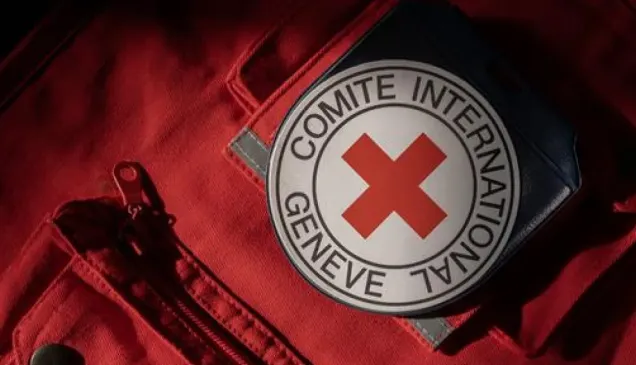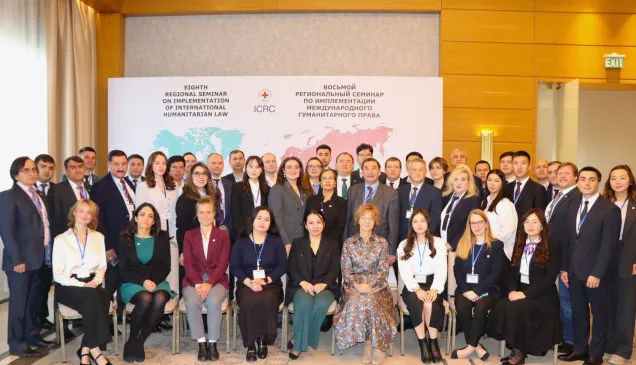Azerbaijan/Armenia: Your questions answered about ICRC’s work
This page addresses frequently asked questions about our response to the humanitarian consequences of the conflict in the region until 5 September 2024. The ICRC closed its Delegation in Azerbaijan on 3 September 2025. For more information about the closure of the ICRC Delegation in Azerbaijan, please read this FAQ.
Question: Why and how does the ICRC operate in Armenia and Azerbaijan?
The ICRC launched its activities across the region in 1992 in response to the humanitarian impact of the conflict in the region. The ICRC has staff in the region as well as offices in Baku, Barda, and Yerevan, and increased staff presence, such as health and weapons contamination experts, to scale up its response to meet people's needs.
Following the escalation of hostilities, the ICRC scaled up its work in the region to support those crossing into Armenia and those staying behind. This included evacuating the sick and the injured to Armenia for further care; supporting people on the move with food and relief items; providing medicines and medical supplies to hospitals; reconnecting separated family members; helping manage the dead with dignity and transferring bodies to Armenia so families could have proper burials; and raising awareness about the risk of mines and unexploded ordnances.
Take care before you share
If you come across content online that you believe to be false or misleading, you can report it directly to the social media platform.
You can also help slow the spread of misinformation by checking the veracity of questionable information before sharing it with others.
Does the ICRC consider there is an International Armed Conflict between Armenia and Azerbaijan?
We discuss our legal qualification in our confidential dialogue with the relevant authorities. What we can say is that the region has suffered from years of armed conflict and violence and that IHL applies.
Can you confirm the media statement announcing the closure of your office in Karabakh?
The ICRC is on the ground in Karabakh. Our team there remains committed to reconnecting separated family members, evacuating people for medical care, providing relief, and helping in the management of the dead as well as looking at other issues of critical importance for the people who left (eg. medical documentation). Our working modalities in the region are discussed in a bilateral and confidential dialogue with the authorities.
It was reported that the ICRC brought body bags into the area. Can you estimate the death toll from the most recent miliary escalation?
The ICRC does not keep a record of the killed and the deceased and therefore we do not have an estimate on the death toll. However, what we can say is that while we focus on providing life-saving relief like food and medical care, forensics support is an integral part of our humanitarian response across the world. We have repeatedly witnessed the suffering that comes when people go missing. This means that we support authorities in managing the dead in a way that helps minimize the risk that people go missing forever. We also supported in the transfer of the dead to families at their request for burials.
Can you comment on the rumors/information that some of the injured (or bodies) following the fuel depot explosion could be taken to hospitals (morgues) in Azerbaijan?
To the ICRC's knowledge, both from its presence on the ground and its dialogue with the concerned decision makers, there was no evacuation of injured persons to any Azerbaijani districts or hospitals following the explosion. All the heavily injured were airlifted by the Russian peacekeeping forces in operations coordinated by the concerned authorities. Those with less severe injuries were transported to Armenia by the ambulances of the Ministry of Health of Armenia, in an operation facilitated by the ICRC. In case of any further enquirers about the current situation and/or any progress made in relation to the identification of the remains of dead, please contact our hotline in Yerevan delegation (09 AM – 06 PM local time or leave a voice mail in case of calling after working hours. ICRC hotline numbers: +374 97 53 05 99, +374 98 25 52 73, +374 77 08 20 27).
Do you still observe movements of population?
The ICRC itself is not involved in registering displaced population, but according to UNHCR, more than 100,000 people have already crossed into Armenia. The ICRC remains on the ground to support the people who stayed behind and will spare no effort to reach them and provide them with the assistance they need. This includes ensuring people have access to medical care; assisting with maintaining and restoring contact between separated family members; or continuing the transport of those who need to be evacuated for medical reasons or wish to leave and ensuring provision of essential assistance they may need.
Have you recorded any violations of IHL? What does the ICRC do when it observes that IHL is not being followed?
The ICRC shares any observations about whether IHL is followed or not directly and confidentially with relevant authorities. We only share this information publicly when we feel it is in the best interest of those we are there to help. This is our approach in every country we work in and is no different in this region.
However, what we can say is that the humanitarian needs of both people staying behind and those who have left for Armenia are vast and will require the international community's support in the weeks and months to come. The ICRC is on the ground – as we have been for the last 30 years. Our teams are committed to helping meet these needs in the wake of the most recent escalation of hostilities. This includes reconnecting separated family members, evacuating people for medical care, providing relief like food, water, and medicine, and helping in the dignified management of the dead so that more families can grieve and have closure.
Does the ICRC visit detainees?
The ICRC has been visiting hundreds of conflict-related detainees in the region since the 1990s. We facilitated repatriation for 365 detainees between 1992 and 1999 and delivered around 30,000 Red Cross Messages to reconnect families separated by the conflict, be it civilian or military. Decades later, our representatives continue to visit persons detained in relation with the conflict and facilitate contact with their families. However, as per its confidentiality policy, the ICRC does not publicly disclose any details on detention visits.
Does the ICRC support States' obligation to clarify the fate of missing people?
Under IHL, States are obligated to clarify the fate of those who have gone missing. In line with this, the ICRC work closely with authorities concerned to support their efforts aimed at clarifying the fate of people who went missing in relation to the conflict. Between January and June 2023, the ICRC supported exhumation work in three sites by providing technical expertise and donating various items. Almost 1,000 families of missing people were contacted and provided with referrals for health, legal, administrative, psychosocial, and other issues.
Based exclusively on information received from the families, the ICRC has established and maintains its own list of missing persons in relation with the conflict. This provides a non-political, common basis for the sides to clarify the fate of missing persons.
The ICRC also works to strengthen the forensic capacity of local stakeholders and develop the legal frameworks supporting the families of the missing. These strictly humanitarian objectives are to provide answers to the families of missing persons.
In its capacity of neutral intermediary, the ICRC also facilitates the transmission of information on missing persons between the sides.
What activities and initiatives has the ICRC recently undertaken in the region related to landmines and unexploded ordnance?
The ICRC works hard to raise awareness of the danger of landmines and unexploded ordnance. As of August 2023, our teams delivered messages on potential risk and safer behaviour to more than 4,800 people exposed to contaminated areas. Around 1,500 mine warning signs were donated to the Azerbaijan National Mine Action Agency to support the marking of mined areas.
With the aim of reducing the risks associated with landmines and explosive remnants of war, the ICRC, along with the Azerbaijan Red Crescent Society (AzRCS), has been using creative ways to expand the audience base and improve the impact of awareness sessions. These innovative efforts include reaching school students through football clubs and matches, reaching shepherds at livestock markets, and reaching men of the community at teahouses.
In Armenian, the ICRC is supporting the Armenian Red Cross Society for the promotion of safe behaviour amongst communities.
Why does the ICRC need to work closely with States and those who control an area during times of conflict?
The ICRC works closely with States and decision-makers during conflicts due to its mandate from IHL, including the Geneva Conventions and their Additional Protocols. All parties in armed conflicts must adhere to IHL principles outlined in these conventions. As a neutral, impartial, and independent organization with global recognition, the ICRC's mission is to provide humanitarian assistance and protection in conflicts, alleviating human suffering, and ensuring compliance with IHL. We collaborate with States and those controlling areas to deliver aid and emphasize that the primary responsibility for upholding IHL lies with them, while we strive to protect, and aid affected people on all fronts.
What would happen if the ICRC took sides?
Simply put, if we were to take sides or make judgements about political considerations, we would lose the trust of the sides. Without this trust, we would not be able to continue carrying out life-saving operations and responding to the needs of the affected communities, prisoners, families of missing persons and the sick.
Why are the principles of neutrality and impartiality so essential during armed conflicts?
Our principles of neutrality and impartiality are not always well understood, especially in situations where there are strong emotions involved. However, our neutrality and impartiality are critical to our ability to operate in any context. This approach has enabled us to conduct critical activities such as evacuating wounded and sick individuals, delivering life-saving medicines, food, and relief supplies, and facilitating the dignified transfer of deceased individuals to their families for grieving and closure.
In the region, this approach allowed us to evacuate hundreds of people who were wounded and sick; deliver life-saving medicines, food, and relief supplies; and transfer bodies to families so they could grieve and have closure. In other places it has helped to facilitate the release of prisoners in Yemen and of kidnapped girls in Nigeria, or to organize the evacuation of civilians from Aleppo, Syria, or from Mariupol, Ukraine. This approach saves lives.
Did the ICRC share information with OCCRP?
Media is crucial in all contexts the ICRC operates. It is a source of vital information for people affected by conflict. The ICRC engages with media - shares information about its programs, organizes training for journalists in humanitarian reporting and brings attention for humanitarian problems faced by conflict-affected people. At the same time, we don’t share or comment publicly on our activities that require confidentiality, such as those pertaining our bilateral dialogue with the authorities or detention work. We take a considered stance when we engage with media as we are aware there could be profound impacts on our ability to carry out our work to meet the needs to people affected by conflict. For us, the diplomacy and coordination it takes to reach these people is done through bilateral dialogue with the concerned parties. We do not publicly share the contents of these meetings. Years of practice have shown us this is the most effective way to carry out our work. Anonymous sources referring to former ICRC employees cannot be considered the official ICRC position and should be taken with caution.



